外研版七年级下一般将来时练习(带答案)
外研版英语七年级英语∶英语一般将来时专练含答案解析百度文库
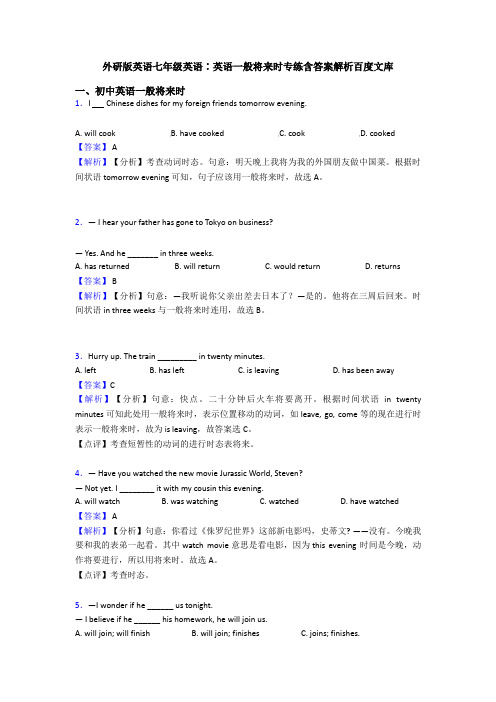
外研版英语七年级英语∶英语一般将来时专练含答案解析百度文库一、初中英语一般将来时1.I Chinese dishes for my foreign friends tomorrow evening.A. will cookB. have cookedC. cookD. cooked【答案】 A【解析】【分析】考查动词时态。
句意:明天晚上我将为我的外国朋友做中国菜。
根据时间状语tomorrow evening可知,句子应该用一般将来时,故选A。
2.— I hear your father has gone to Tokyo on business?— Yes. And he _______ in three weeks.A. has returnedB. will returnC. would returnD. returns【答案】 B【解析】【分析】句意:—我听说你父亲出差去日本了?—是的。
他将在三周后回来。
时间状语in three weeks与一般将来时连用,故选B。
3.Hurry up. The train _________ in twenty minutes.A. leftB. has leftC. is leavingD. has been away【答案】C【解析】【分析】句意:快点。
二十分钟后火车将要离开。
根据时间状语in twenty minutes可知此处用一般将来时,表示位置移动的动词,如leave, go, come等的现在进行时表示一般将来时,故为is leaving,故答案选C。
【点评】考查短暂性的动词的进行时态表将来。
4.— Have you watched the new movie Jurassic World, Steven?— Not yet. I ________ it with my cousin this evening.A. will watchB. was watchingC. watchedD. have watched【答案】 A【解析】【分析】句意:你看过《侏罗纪世界》这部新电影吗,史蒂文? ——没有。
(完整)外研版七年级下一般将来时练习(带答案)

(完整)外研版七年级下一般将来时练习(带答案)A moveB movesC will moveD movedD2.My sister wants a new dress. She _____ it to the party.A wearsB wearingC wearD is going to wearB3.-Do you think grandma and grandpa _____ late?-No, the train is usually on time.A wereB will beC wasD have beenD4.Just go down this road and you _____ the hospital next to the school.A seeB sawC have seenD will see用Be going to及括号中所给动词的适当形式填空1.We____________________(watch) a fashion(时装)show next weekend.are going to watch2._____ he _______________(have) a violin lesson tomorrow?Is going to have3.Look at the clouds. It ___________________(rain).is going to rain4.–What _____you ______________ (do) tomorrow afternoon?aregoing to do-I _________________ (see) my aunt.am going to see5._____ they ___________ (sing) an English song at Lily’s birthdayparty?Aregoing to sing句型转换1.They are going to play football this afternoon.(改为否定句)They _____ _____ _____ _____ football this afternoon.aren’t going to play2.I’m going to stay at home on Sunday.(改成一般疑问句)_____ _____ going to stay at home on Sunday?_____,I’m _____.Are youNonot3.My mother‘s going to do the cleaning at the weekend.(就画线部分提问)_____ _____ your mother _______ _______ _______ at the weekend?What isgoing to do4.Jim and Tom are going to meet at the school gate(就画线部分提问)_____ _____ Jim and Tom _____ _____ _____?Where aregoing to meet5.She helps with the housework on Saturday.(用next Saturday替换on Saturday)She _______ _______ _______ _______ with the housework next Saturday.is going to help6.The students will study at home in the future.(改为一般疑问句)_______ the students _______ at home in the future.Will study7.My mother will be back in an hour.(就画线部分提问)How soon _______ your mother _______ back?Will be8.Tom will be in Shanghai in ten days. (改为否定句)Tom _______ _______ in Shanghai in ten days.Won’t be9.—Will there be more cars in five years?(作出肯定回答)—_____, _____ _____.Yes, there will10.—Will Lucy travel around the world?(作出否定答案)—_____,_____ _____.No, she won’t用括号内的时间状语改写句子。
外研版英语英语一般将来时训练题含答案解析

外研版英语英语一般将来时训练题含答案解析一、初中英语一般将来时1.In the near future, there ________ self-driving cars in our city.A. isB. wasC. areD. will be【答案】 D【解析】【分析】句意:在不久的将来,我们城市将会有自动驾驶汽车。
根据In the near future,可知时态是一般将来时,there be结构的一般将来时为:there will be,故选D。
【点评】考查时态,注意there be结构的一般将来时为:there will be的用法。
2.— Let's go fishing if it this weekend.— But nobody knows if it .A. is fine; will rainB. will be rain; rainsC. will be fine; will rainD. is fine; rains 【答案】 A【解析】【分析】句意:——如果这个周末晴天我们去钓鱼吧。
——但是没人知道是否会下雨。
第一个空前的if引导条件状语从句,意思是“如果”,从句中用一般现在时表示将来;第二个空前的if引导宾语从句,意思是“是否”,根据从句的tomorrow可知用一般将来时;故选A。
【点评】考查动词的时态。
3.—Tom wants to know if you ________ a picnic next Sunday.—Yes. But if it ________, we'll visit the museum instead.A. will have; will rainB. have; rainsC. have; will rainD. will have; rains【答案】D【解析】【分析】句意:汤姆想知道下周日你们是否去野炊。
是的,但是如果下雨的话,我们将改去参观博物馆。
外研版英语七年级英语∶英语一般将来时专练含解析百度文库

外研版英语七年级英语∶英语一般将来时专练含解析百度文库一、初中英语一般将来时1.There ______ a funny cartoon on CCTV 6 this evening.A. willB. will haveC. is going to beD. is going to have【答案】 C【解析】【分析】句意:今天晚上CCTV6有一部有趣的动画片。
今天晚上,将会有,用there will be 或者there is going to be因为a funny cartoon是单数。
故选C。
【点评】考查时态的用法。
2.If it is clear tomorrow , I ________a bike to the underground station.A. rideB. will rideC. rodeD. have ridden【答案】 B【解析】【分析】句意:如果明天天气好的话,我会骑自行车去地铁站。
ride骑车,动词原形;will ride是一般将来时态;rode是ride的过去式形式;have ridden是现在完成时态。
句中if引导的是条件状语从句,从句中一般现在时态,主句应使用一般将来时态,故应选B。
【点评】考查动词的时态,以及if引导的是条件状语从句,从句中一般现在时态,主句应使用一般将来时态。
3.—Could you tell me_______?—In five minutes, at 10: 25.A. when did the next underground arriveB. when the next underground arrivedC. when will the next underground arriveD. when the next underground will arrive【答案】D【解析】【分析】句意:—你能告诉我下一个地铁什么时候到吗?—五分钟后,10点25分。
外研版英语英语英语一般将来时测试卷(有答案)含答案解析
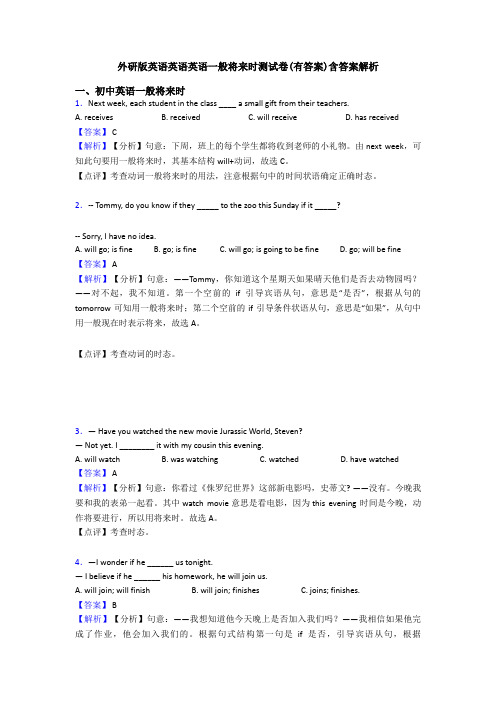
外研版英语英语英语一般将来时测试卷(有答案)含答案解析一、初中英语一般将来时1.Next week, each student in the class ____ a small gift from their teachers.A. receivesB. receivedC. will receiveD. has received【答案】 C【解析】【分析】句意:下周,班上的每个学生都将收到老师的小礼物。
由next week,可知此句要用一般将来时,其基本结构will+动词,故选C。
【点评】考查动词一般将来时的用法,注意根据句中的时间状语确定正确时态。
2.-- Tommy, do you know if they _____ to the zoo this Sunday if it _____?-- Sorry, I have no idea.A. will go; is fineB. go; is fineC. will go; is going to be fineD. go; will be fine【答案】 A【解析】【分析】句意:——Tommy,你知道这个星期天如果晴天他们是否去动物园吗?——对不起,我不知道。
第一个空前的if引导宾语从句,意思是“是否”,根据从句的tomorrow可知用一般将来时;第二个空前的if引导条件状语从句,意思是“如果”,从句中用一般现在时表示将来,故选A。
【点评】考查动词的时态。
3.— Have you watched the new movie Jurassic World, Steven?— Not yet. I ________ it with my cousin this evening.A. will watchB. was watchingC. watchedD. have watched【答案】 A【解析】【分析】句意:你看过《侏罗纪世界》这部新电影吗,史蒂文? ——没有。
外研版七年级英语下册单元语法专练-Module4-一般将来时will的用法(专练+答案)

Module 4 Life in the future.Grammar 一般将来时will的用法(时间:100分钟,满分:100分)一、单项选择(本大题共40小题,每小题1.5分,共60分)1.—What is Mary going to do?—She is going ________ a film.A.seeing B.see C.to see2.—What ________ you ________ to do?—I’m going to have P.E. lesson.A.are, going B.do, go C.is, going3.There ________ a meeting tomorrow afternoon.A.will be going to B.will going to be C.is going to be4.My family and I ________ to the Olympic Park tomorrow.A.go B.will go C.went5.—You will ________ better soon.—I hope so.A.feel B.feels C.feeling6.There ________ a class meeting tomorrow morning. The teacher will tell the students something important.A.will have B.is going to have C.is going to be 7.—Will they visit Shanghai next month?—________. They will go to Beijing.A.Yes, I will B.No, I won’t C.Yes, they will D.No, they won’t 8.“I won’t ________ to this place!” The girl said angrily(生气地).A.return B.return back C.returned D.returned back 9.— ________ he ________ to travel to Guangzhou next month?—Yes he is.A.Will; going B.Is; going C.Does; go D.Is; go10.I ________ back home next Sunday. How about you?A.was B.am C.am going to be D.go11.My bike is broken. I _________ a bus to school this afternoon.A.take B.took C.will take D.takes12.—I am very busy now. I ________ you an e-mail later.—OK.A.send B.sends C.sent D.will send 13.— ________ you ________ free tomorrow?— Yes, I am.A.Are; going to B.Are; will C.Are; will be D.Are; going to be14.Bill ________ in America tomorrow afternoon.A.arrive B.arrives C.arrived D.will arrive 15.Mary wants to buy the silk dress. She ________ it to my birthday party next week. A.wear B.wore C.will wear D.is wearing 16.—_______ Mr. Smith visit Beijing last week?—No, but he _______ Beijing with his son next time.A.Did; visits B.Did; will visitC.Does; visits D.Will; will visit17.— I don’t think Lucy will come today, ________ she?— ________, she won’t. She is ill and stays at homeA.won’t; No B.will; No C.won’t; Yes D.will; Yes 18.There ________ a sports meeting in our school next week.A.will have B.is going to have C.will be D.is19.—Is your sister going to buy some clothes?—__________.A.Yes, he is B.No, he isn’t C.Yes, she is D.No, she can’t 20.The scarf is only 10 dollars. I ________ it.A.buy B.take C.will buy D.will take 21.—There _______ a show in the school hall this afternoon, right?—Yeah. Let’s go and watch it together.A.will have B.will be C.is going to D.is going to have22.—There ________ a football match in the sports centre next week.—Great!A.is going to have B.will have C.is going to be D.are going to be23.What will your life _______ in the future.A.like B.be like C.likes D.looks like 24.There ________ a talk about how to learn English by Li Yang tomorrow evening. A.was B.will be C.had D.will have 25.—Please don’t forget to take part in the sports meeting next Monday.—________.A.I don’t B.I won’t C.I can’t D.I haven’t 26.He ________ very busy this week. He ________ free next week.A.will be; is B.is; is C.will be; will be D.is; will be 27.I don’t know if he ________ to the English corner, but I will ask him about that when he ________ to the class.A.goes; will come B.will go; will come C.goes; comes D.will go; comes 28.—Would you please turn down the TV a little? Jack is doing his homework.—Terribly sorry. I ________.A.will B.am going to C.won’t D.do29.Mr. Smith ________ a talk on country music next Monday.A.gives B.gave C.has given D.will give 30.If you don’t go tomorrow, ________.A.I don’t go either B.either will I C.neither do I go D.neither will I 31.Simon hopes Li Lei, his best friend ________ a football star in the world.A.are B.to be C.will be D.be32.We all hope you ________ hard every day.A.to study B.will study C.studies D.studying 33.I hope our team ________ the game tomorrow.A.to win B.winning C.will win D.win 34.—Do you think grandpa and grandma ________ late?—No, the train is usually on time.A.are B.were C.was D.will be 35.Listen to the weather report, and you’ll know what the weather ________ like next week.A.is B.was C.will be D.is being 36.— What is your plan for the May Day holiday?— I ________ a film with my friends.A.see B.sees C.am seeing D.will see 37.—Will students have lots of homework to do this weekend?—________. Teachers won’t give them any homework because of the school trip. A.Yes, they will B.Yes, they do C.No, they won’t D.No, they don’t 38.Many people think that robots are smart and they ________ able to talk like us in the future.A.are B.aren’t C.will be D.won’t be 39.—Will there be a space station in our country?—_________. We will build it in one year.A.Yes, they will B.Yes, there will C.No, they won’t D.No, there won’t 40.—Do you think people will lose jobs in the future because of robots, Tina?— ________. Robots can’t do all the things for us.A.Yes, they will B.Yes, they do C.No, they won’t D.No, they don’t 二、用所给单词的正确形式填空(本大题共10小题,每小题1分,共10分)41.If there is a fire, I ________ (call) 119 for help.42.Look at the clouds in the sky. I think it _________ (rain), isn’t it?43.The weather report says it _________ (rain) tomorrow.44.Who _________ (help) the old people clean their flats this weekend?45.His mother’s birthday is coming. He _________ (buy) her a present.46.Who _________ (give) us a talk about English study this afternoon?47.Do you think there ________ (be) a movie tomorrow evening?48.I ________ (not go) to school tomorrow.49.Jim ________ (not finish) his homework in five days.50.Kate ________ (check) her e-mails on Friday evening.三、完成句子(本大题共10小题,每小题2分,共20分)51.如果明天下雨,我们会待在家里。
外研版英语英语一般将来时经典例题含答案
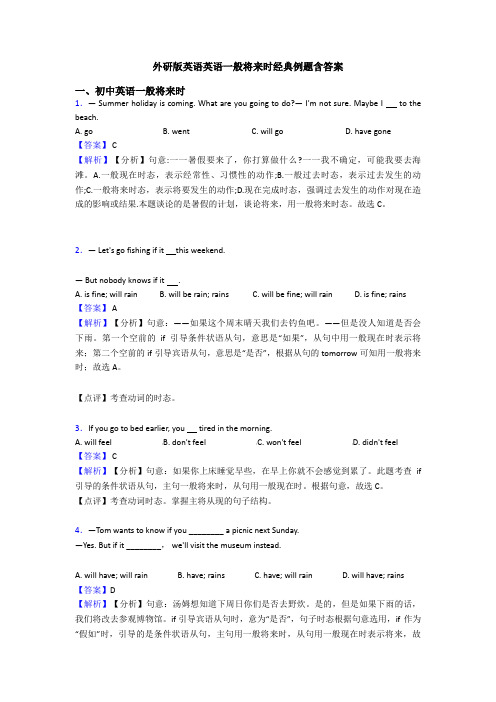
外研版英语英语一般将来时经典例题含答案一、初中英语一般将来时1.— Summer holiday is coming. What are you going to do?— I'm not sure. Maybe I to the beach.A. goB. wentC. will goD. have gone【答案】 C【解析】【分析】句意:一一暑假要来了,你打算做什么?一一我不确定,可能我要去海滩。
A.一般现在时态,表示经常性、习惯性的动作;B.一般过去时态,表示过去发生的动作;C.一般将来时态,表示将要发生的动作;D.现在完成时态,强调过去发生的动作对现在造成的影响或结果.本题谈论的是暑假的计划,谈论将来,用一般将来时态。
故选C。
2.— Let's go fishing if it this weekend.— But nobody knows if it .A. is fine; will rainB. will be rain; rainsC. will be fine; will rainD. is fine; rains 【答案】 A【解析】【分析】句意:——如果这个周末晴天我们去钓鱼吧。
——但是没人知道是否会下雨。
第一个空前的if引导条件状语从句,意思是“如果”,从句中用一般现在时表示将来;第二个空前的if引导宾语从句,意思是“是否”,根据从句的tomorrow可知用一般将来时;故选A。
【点评】考查动词的时态。
3.If you go to bed earlier, you tired in the morning.A. will feelB. don't feelC. won't feelD. didn't feel【答案】 C【解析】【分析】句意:如果你上床睡觉早些,在早上你就不会感觉到累了。
此题考查if 引导的条件状语从句,主句一般将来时,从句用一般现在时。
外研版英语七年级英语∶英语一般将来时专练附答案
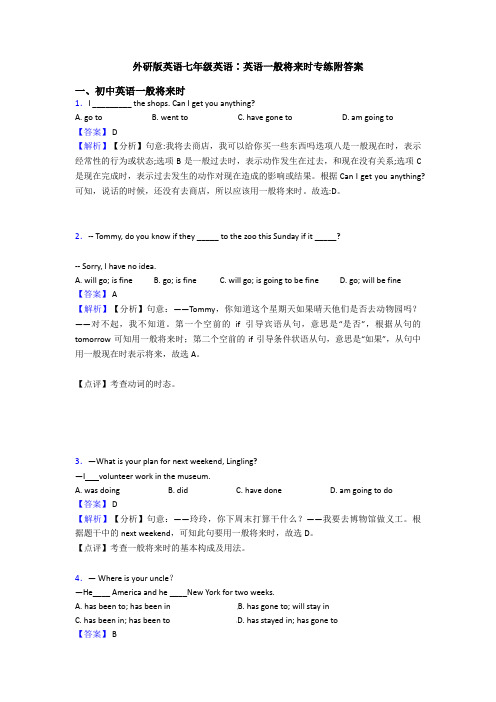
外研版英语七年级英语∶英语一般将来时专练附答案一、初中英语一般将来时1.I _________ the shops. Can I get you anything?A. go toB. went toC. have gone toD. am going to【答案】 D【解析】【分析】句意:我将去商店,我可以给你买一些东西吗迭项八是一般现在时,表示经常性的行为或状态;选项B是一般过去时,表示动作发生在过去,和现在没有关系;选项C 是现在完成时,表示过去发生的动作对现在造成的影响或结果。
根据Can I get you anything?可知,说话的时候,还没有去商店,所以应该用一般将来时。
故选:D。
2.-- Tommy, do you know if they _____ to the zoo this Sunday if it _____?-- Sorry, I have no idea.A. will go; is fineB. go; is fineC. will go; is going to be fineD. go; will be fine【答案】 A【解析】【分析】句意:——Tommy,你知道这个星期天如果晴天他们是否去动物园吗?——对不起,我不知道。
第一个空前的if引导宾语从句,意思是“是否”,根据从句的tomorrow可知用一般将来时;第二个空前的if引导条件状语从句,意思是“如果”,从句中用一般现在时表示将来,故选A。
【点评】考查动词的时态。
3.—What is your plan for next weekend, Lingling?—I volunteer work in the museum.A. was doingB. didC. have doneD. am going to do【答案】 D【解析】【分析】句意:——玲玲,你下周末打算干什么?——我要去博物馆做义工。
【七年级】七下英语一般将来时复习练习(含解析外研版)
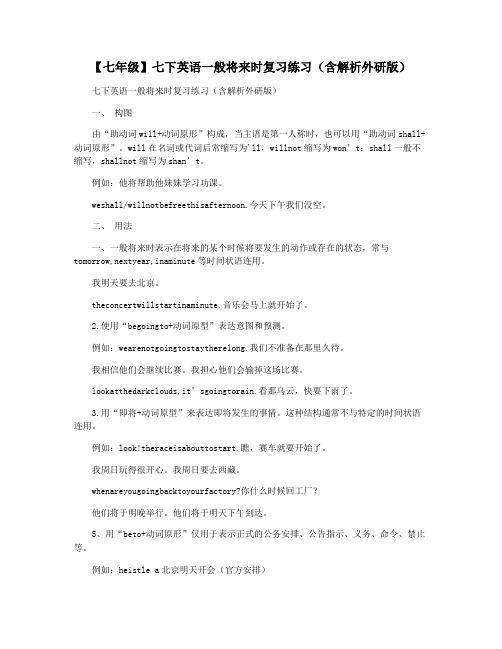
【七年级】七下英语一般将来时复习练习(含解析外研版)七下英语一般将来时复习练习(含解析外研版)一、构图由“助动词will+动词原形”构成,当主语是第一人称时,也可以用“助动词shall+动词原形”。
will在名词或代词后常缩写为'll,willnot缩写为won’t;shall一般不缩写,shallnot缩写为shan’t。
例如:他将帮助他妹妹学习功课。
weshall/willnotbefreethisafternoon.今天下午我们没空。
二、用法一、一般将来时表示在将来的某个时候将要发生的动作或存在的状态,常与tomorrow,nextyear,inaminute等时间状语连用。
我明天要去北京。
theconcertwillstartinaminute.音乐会马上就开始了。
2.使用“begoingto+动词原型”表达意图和预测。
例如:wearenotgoingtostaytherelong.我们不准备在那里久待。
我相信他们会继续比赛。
我担心他们会输掉这场比赛。
lo okatthedarkclouds,it’sgoingtorain.看那乌云,快要下雨了。
3.用“即将+动词原型”来表达即将发生的事情。
这种结构通常不与特定的时间状语连用。
例如:look!theraceisabouttostart.瞧,赛车就要开始了。
我周日玩得很开心。
我周日要去西藏。
whenareyougoingbacktoyourfactory?你什么时候回工厂?他们将于明晚举行。
他们将于明天下午到达。
5、用“beto+动词原形”仅用于表示正式的公务安排、公告指示、义务、命令、禁止等。
例如:heistle a北京明天开会(官方安排)tellhimhe’snottobebacklate.告诉他不准迟回。
(禁止)你应该向警方报告。
你应该报警的。
(义务)you’renotto(=mustn’t)tellhimanythingaboutourplans.(禁止)注:Beto强调客观安排或被指示做某事,begoingto强调主观意图或计划。
外研版英语初一 英语一般将来时填空练习题及答案解析
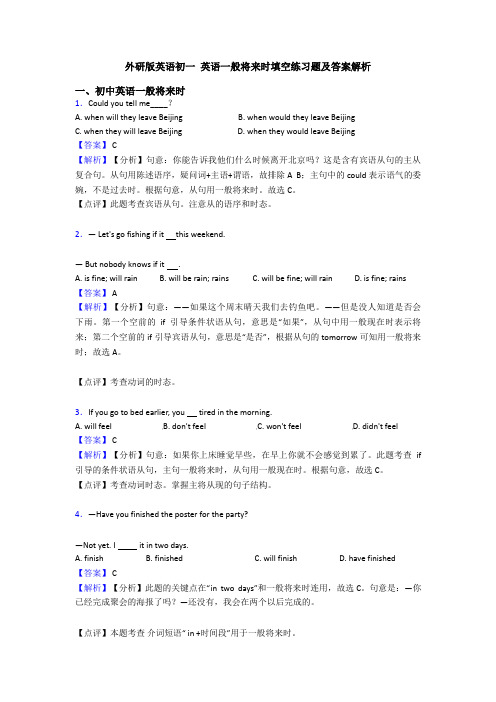
外研版英语初一英语一般将来时填空练习题及答案解析一、初中英语一般将来时1.Could you tell me____?A. when will they leave BeijingB. when would they leave BeijingC. when they will leave BeijingD. when they would leave Beijing【答案】 C【解析】【分析】句意:你能告诉我他们什么时候离开北京吗?这是含有宾语从句的主从复合句。
从句用陈述语序,疑问词+主语+谓语,故排除A B;主句中的could表示语气的委婉,不是过去时。
根据句意,从句用一般将来时。
故选C。
【点评】此题考查宾语从句。
注意从的语序和时态。
2.— Let's go fishing if it this weekend.— But nobody knows if it .A. is fine; will rainB. will be rain; rainsC. will be fine; will rainD. is fine; rains 【答案】 A【解析】【分析】句意:——如果这个周末晴天我们去钓鱼吧。
——但是没人知道是否会下雨。
第一个空前的if引导条件状语从句,意思是“如果”,从句中用一般现在时表示将来;第二个空前的if引导宾语从句,意思是“是否”,根据从句的tomorrow可知用一般将来时;故选A。
【点评】考查动词的时态。
3.If you go to bed earlier, you tired in the morning.A. will feelB. don't feelC. won't feelD. didn't feel【答案】 C【解析】【分析】句意:如果你上床睡觉早些,在早上你就不会感觉到累了。
此题考查if 引导的条件状语从句,主句一般将来时,从句用一般现在时。
外研版英语英语一般将来时专项练习含答案

外研版英语英语一般将来时专项练习含答案一、初中英语一般将来时1.If you want to visit the Palace Museum, I ________ tickets for you tomorrow.A. will bookB. bookedC. have bookedD. was booking【答案】 A【解析】【分析】句意:如果你想参观故宫博物馆,我明天给你订票。
book,订购,A.一般将来时;B.一般过去时;C.现在完成时;D.过去进行时。
根据tomorrow,可知动词用一般将来时,故选A。
【点评】考查动词的时态,注意一般将来时的用法。
2.If it is clear tomorrow , I ________a bike to the underground station.A. rideB. will rideC. rodeD. have ridden【答案】 B【解析】【分析】句意:如果明天天气好的话,我会骑自行车去地铁站。
ride骑车,动词原形;will ride是一般将来时态;rode是ride的过去式形式;have ridden是现在完成时态。
句中if引导的是条件状语从句,从句中一般现在时态,主句应使用一般将来时态,故应选B。
【点评】考查动词的时态,以及if引导的是条件状语从句,从句中一般现在时态,主句应使用一般将来时态。
3.Next week, each student in the class ____ a small gift from their teachers.A. receivesB. receivedC. will receiveD. has received【答案】 C【解析】【分析】句意:下周,班上的每个学生都将收到老师的小礼物。
由next week,可知此句要用一般将来时,其基本结构will+动词,故选C。
【点评】考查动词一般将来时的用法,注意根据句中的时间状语确定正确时态。
外研版英语七年级英语∶英语一般将来时专练含解析

外研版英语七年级英语∶英语一般将来时专练含解析一、初中英语一般将来时1.— Excuse me. Could you tell me ?— It will leave at 4:00 p.m.A. how will you go to ShanghaiB. how you will go to ShanghaiC. when the bus would leave for ShanghaiD. when the bus will leave for Shanghai【答案】 D【解析】【分析】这是一道根据回答写出问句所缺成分的题目,阅题时要仔细分析回答的句子。
句意:打扰一下,你能告诉我这辆公交车什么时候动身前往上海吗?它将会在下午4点的时候离开。
据回答知问句问的是时间,故排除A和B。
由题知,句子是一般将来时,故问句中也要用一般将来时态。
故选D。
【点评】本题需要考生根据回答反推问题,在阅题时要仔细审题。
2.-- Tommy, do you know if they _____ to the zoo this Sunday if it _____?-- Sorry, I have no idea.A. will go; is fineB. go; is fineC. will go; is going to be fineD. go; will be fine【答案】 A【解析】【分析】句意:——Tommy,你知道这个星期天如果晴天他们是否去动物园吗?——对不起,我不知道。
第一个空前的if引导宾语从句,意思是“是否”,根据从句的tomorrow可知用一般将来时;第二个空前的if引导条件状语从句,意思是“如果”,从句中用一般现在时表示将来,故选A。
【点评】考查动词的时态。
3.There ___________ a meeting tomorrow afternoon.A. will be going toB. will going to beC. is going to beD. will go to be【答案】 C【解析】【分析】句意:明天下午将有一次会议。
外研版英语初中英语分类练习——英语一般将来时及答案百度文库
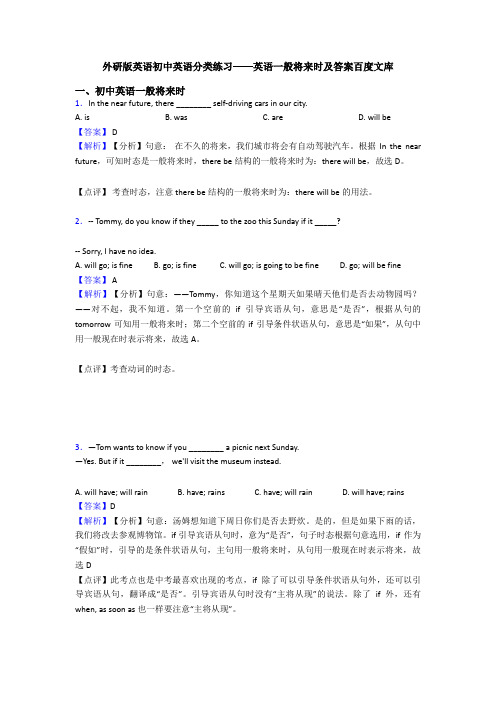
外研版英语初中英语分类练习——英语一般将来时及答案百度文库一、初中英语一般将来时1.In the near future, there ________ self-driving cars in our city.A. isB. wasC. areD. will be【答案】 D【解析】【分析】句意:在不久的将来,我们城市将会有自动驾驶汽车。
根据In the near future,可知时态是一般将来时,there be结构的一般将来时为:there will be,故选D。
【点评】考查时态,注意there be结构的一般将来时为:there will be的用法。
2.-- Tommy, do you know if they _____ to the zoo this Sunday if it _____?-- Sorry, I have no idea.A. will go; is fineB. go; is fineC. will go; is going to be fineD. go; will be fine【答案】 A【解析】【分析】句意:——Tommy,你知道这个星期天如果晴天他们是否去动物园吗?——对不起,我不知道。
第一个空前的if引导宾语从句,意思是“是否”,根据从句的tomorrow可知用一般将来时;第二个空前的if引导条件状语从句,意思是“如果”,从句中用一般现在时表示将来,故选A。
【点评】考查动词的时态。
3.—Tom wants to know if you ________ a picnic next Sunday.—Yes. But if it ________, we'll visit the museum instead.A. will have; will rainB. have; rainsC. have; will rainD. will have; rains【答案】D【解析】【分析】句意:汤姆想知道下周日你们是否去野炊。
外研版英语英语一般将来时练习题 含答案解析
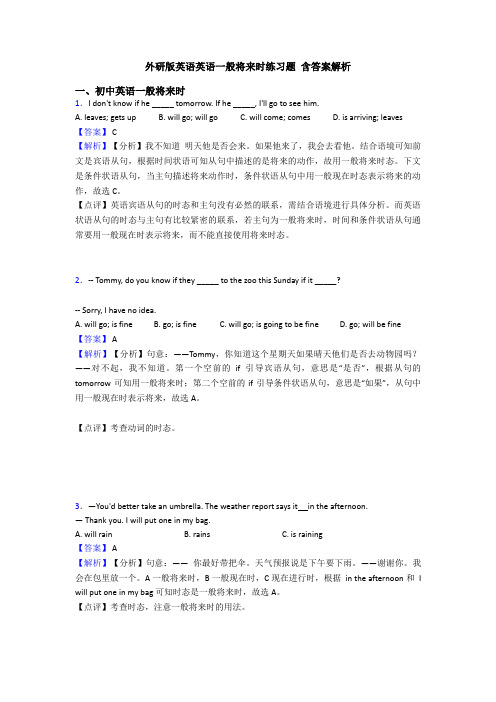
外研版英语英语一般将来时练习题含答案解析一、初中英语一般将来时1.I don't know if he _____ tomorrow. If he _____, I'll go to see him.A. leaves; gets upB. will go; will goC. will come; comesD. is arriving; leaves【答案】 C【解析】【分析】我不知道明天他是否会来。
如果他来了,我会去看他。
结合语境可知前文是宾语从句,根据时间状语可知从句中描述的是将来的动作,故用一般将来时态。
下文是条件状语从句,当主句描述将来动作时,条件状语从句中用一般现在时态表示将来的动作,故选C。
【点评】英语宾语从句的时态和主句没有必然的联系,需结合语境进行具体分析。
而英语状语从句的时态与主句有比较紧密的联系,若主句为一般将来时,时间和条件状语从句通常要用一般现在时表示将来,而不能直接使用将来时态。
2.-- Tommy, do you know if they _____ to the zoo this Sunday if it _____?-- Sorry, I have no idea.A. will go; is fineB. go; is fineC. will go; is going to be fineD. go; will be fine【答案】 A【解析】【分析】句意:——Tommy,你知道这个星期天如果晴天他们是否去动物园吗?——对不起,我不知道。
第一个空前的if引导宾语从句,意思是“是否”,根据从句的tomorrow可知用一般将来时;第二个空前的if引导条件状语从句,意思是“如果”,从句中用一般现在时表示将来,故选A。
【点评】考查动词的时态。
3.—You'd better take an umbrella. The weather report says it in the afternoon.— Thank you. I will put one in my bag.A. will rainB. rainsC. is raining【答案】 A【解析】【分析】句意:——你最好带把伞。
外研版英语英语一般将来时训练题含答案
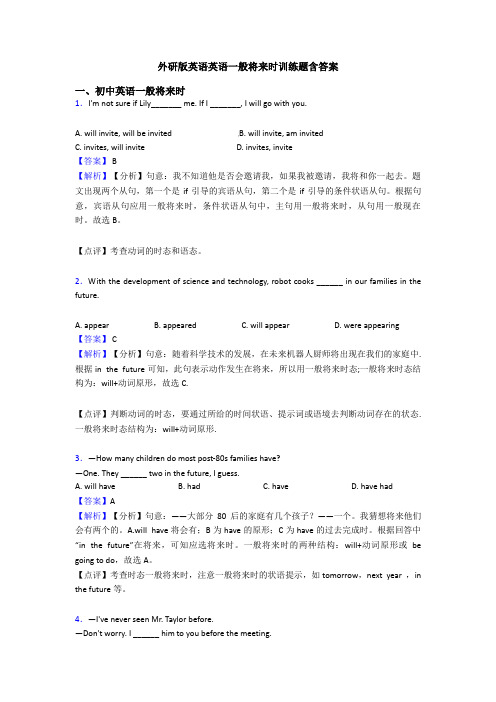
外研版英语英语一般将来时训练题含答案一、初中英语一般将来时1.I'm not sure if Lily_______ me. If I _______, I will go with you.A. will invite, will be invitedB. will invite, am invitedC. invites, will inviteD. invites, invite【答案】 B【解析】【分析】句意:我不知道他是否会邀请我,如果我被邀请,我将和你一起去。
题文出现两个从句,第一个是if引导的宾语从句,第二个是if引导的条件状语从句。
根据句意,宾语从句应用一般将来时,条件状语从句中,主句用一般将来时,从句用一般现在时。
故选B。
【点评】考查动词的时态和语态。
2.With the development of science and technology, robot cooks ______ in our families in the future.A. appearB. appearedC. will appearD. were appearing【答案】 C【解析】【分析】句意:随着科学技术的发展,在未来机器人厨师将出现在我们的家庭中. 根据in the future可知,此句表示动作发生在将来,所以用一般将来时态;一般将来时态结构为:will+动词原形,故选C.【点评】判断动词的时态,要通过所给的时间状语、提示词或语境去判断动词存在的状态. 一般将来时态结构为:will+动词原形.3.—How many children do most post-80s families have?—One. They ______ two in the future, I guess.A. will haveB. hadC. haveD. have had【答案】A【解析】【分析】句意:——大部分80后的家庭有几个孩子?——一个。
外研版英语初中英语分类练习——英语一般将来时附答案百度文库
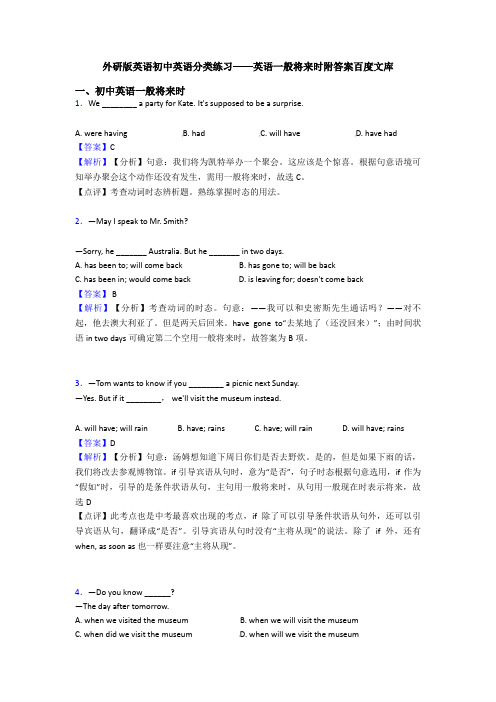
外研版英语初中英语分类练习——英语一般将来时附答案百度文库一、初中英语一般将来时1.We ________ a party for Kate. It's supposed to be a surprise.A. were havingB. hadC. will haveD. have had【答案】C【解析】【分析】句意:我们将为凯特举办一个聚会。
这应该是个惊喜。
根据句意语境可知举办聚会这个动作还没有发生,需用一般将来时,故选C。
【点评】考查动词时态辨析题。
熟练掌握时态的用法。
2.—May I speak to Mr. Smith?—Sorry, he _______ Australia. But he _______ in two days.A. has been to; will come backB. has gone to; will be backC. has been in; would come backD. is leaving for; doesn't come back【答案】 B【解析】【分析】考查动词的时态。
句意:——我可以和史密斯先生通话吗?——对不起,他去澳大利亚了。
但是两天后回来。
have gone to“去某地了(还没回来)”;由时间状语in two days可确定第二个空用一般将来时,故答案为B项。
3.—Tom wants to know if you ________ a picnic next Sunday.—Yes. But if it ________, we'll visit the museum instead.A. will have; will rainB. have; rainsC. have; will rainD. will have; rains 【答案】D【解析】【分析】句意:汤姆想知道下周日你们是否去野炊。
是的,但是如果下雨的话,我们将改去参观博物馆。
外研版英语七年级英语∶英语一般将来时专练及答案推荐精选
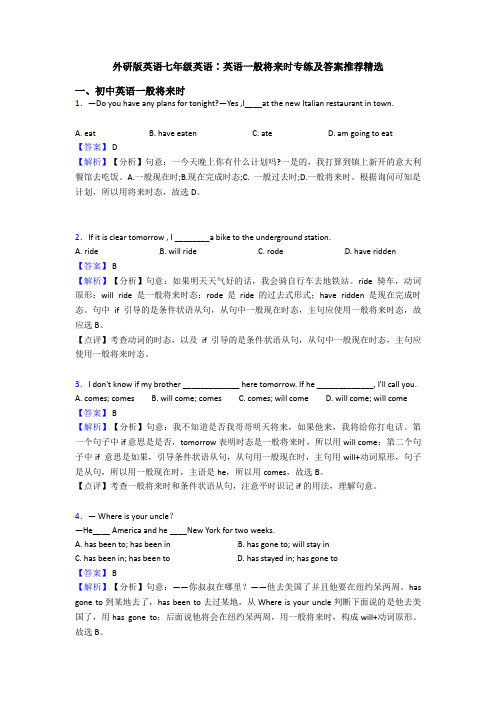
外研版英语七年级英语∶英语一般将来时专练及答案推荐精选一、初中英语一般将来时1.—Do you have any plans for tonight?—Yes ,I____at the new Italian restaurant in town.A. eatB. have eatenC. ateD. am going to eat【答案】 D【解析】【分析】句意:一今天晚上你有什么计划吗?一是的,我打算到镇上新开的意大利餐馆去吃饭。
A.一般现在时;B.现在完成时态;C. 一般过去时;D.一般将来时。
根据询问可知是计划,所以用将来时态,故选D。
2.If it is clear tomorrow , I ________a bike to the underground station.A. rideB. will rideC. rodeD. have ridden【答案】 B【解析】【分析】句意:如果明天天气好的话,我会骑自行车去地铁站。
ride骑车,动词原形;will ride是一般将来时态;rode是ride的过去式形式;have ridden是现在完成时态。
句中if引导的是条件状语从句,从句中一般现在时态,主句应使用一般将来时态,故应选B。
【点评】考查动词的时态,以及if引导的是条件状语从句,从句中一般现在时态,主句应使用一般将来时态。
3.I don't know if my brother _____________ here tomorrow. If he _____________, I'll call you.A. comes; comesB. will come; comesC. comes; will comeD. will come; will come【答案】 B【解析】【分析】句意:我不知道是否我哥哥明天将来,如果他来,我将给你打电话。
第一个句子中if意思是是否,tomorrow表明时态是一般将来时,所以用will come;第二个句子中if 意思是如果,引导条件状语从句,从句用一般现在时,主句用will+动词原形,句子是从句,所以用一般现在时,主语是he,所以用comes,故选B。
外研版英语英语一般将来时练习及答案详解 含答案解析
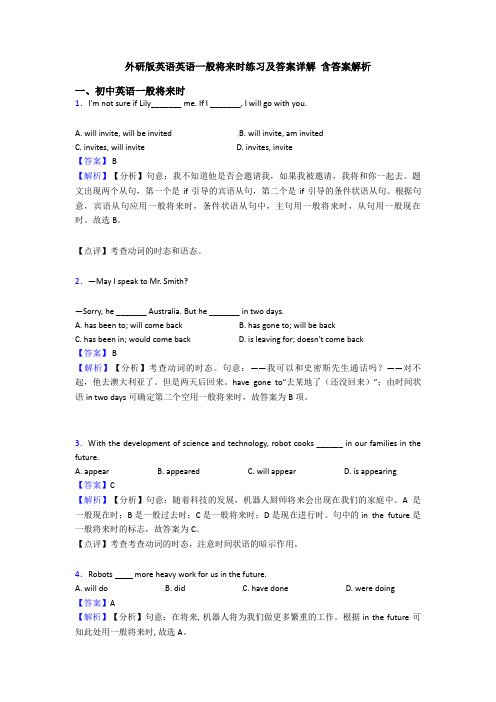
外研版英语英语一般将来时练习及答案详解含答案解析一、初中英语一般将来时1.I'm not sure if Lily_______ me. If I _______, I will go with you.A. will invite, will be invitedB. will invite, am invitedC. invites, will inviteD. invites, invite【答案】 B【解析】【分析】句意:我不知道他是否会邀请我,如果我被邀请,我将和你一起去。
题文出现两个从句,第一个是if引导的宾语从句,第二个是if引导的条件状语从句。
根据句意,宾语从句应用一般将来时,条件状语从句中,主句用一般将来时,从句用一般现在时。
故选B。
【点评】考查动词的时态和语态。
2.—May I speak to Mr. Smith?—Sorry, he _______ Australia. But he _______ in two days.A. has been to; will come backB. has gone to; will be backC. has been in; would come backD. is leaving for; doesn't come back【答案】 B【解析】【分析】考查动词的时态。
句意:——我可以和史密斯先生通话吗?——对不起,他去澳大利亚了。
但是两天后回来。
have gone to“去某地了(还没回来)”;由时间状语in two days可确定第二个空用一般将来时,故答案为B项。
3.With the development of science and technology, robot cooks ______ in our families in the future.A. appearB. appearedC. will appearD. is appearing【答案】C【解析】【分析】句意:随着科技的发展,机器人厨师将来会出现在我们的家庭中。
外研版英语英语一般将来时专项练习综合含答案
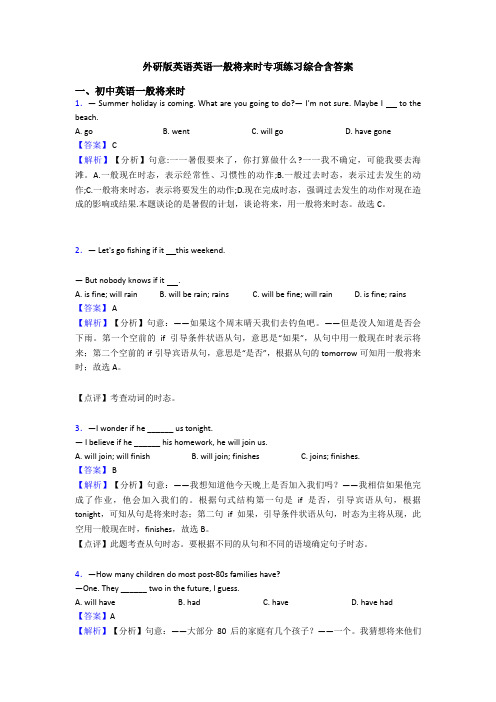
外研版英语英语一般将来时专项练习综合含答案一、初中英语一般将来时1.— Summer holiday is coming. What are you going to do?— I'm not sure. Maybe I to the beach.A. goB. wentC. will goD. have gone【答案】 C【解析】【分析】句意:一一暑假要来了,你打算做什么?一一我不确定,可能我要去海滩。
A.一般现在时态,表示经常性、习惯性的动作;B.一般过去时态,表示过去发生的动作;C.一般将来时态,表示将要发生的动作;D.现在完成时态,强调过去发生的动作对现在造成的影响或结果.本题谈论的是暑假的计划,谈论将来,用一般将来时态。
故选C。
2.— Let's go fishing if it this weekend.— But nobody knows if it .A. is fine; will rainB. will be rain; rainsC. will be fine; will rainD. is fine; rains 【答案】 A【解析】【分析】句意:——如果这个周末晴天我们去钓鱼吧。
——但是没人知道是否会下雨。
第一个空前的if引导条件状语从句,意思是“如果”,从句中用一般现在时表示将来;第二个空前的if引导宾语从句,意思是“是否”,根据从句的tomorrow可知用一般将来时;故选A。
【点评】考查动词的时态。
3.—I wonder if he ______ us tonight.— I believe if he ______ his homework, he will join us.A. will join; will finishB. will join; finishesC. joins; finishes.【答案】 B【解析】【分析】句意:——我想知道他今天晚上是否加入我们吗?——我相信如果他完成了作业,他会加入我们的。
- 1、下载文档前请自行甄别文档内容的完整性,平台不提供额外的编辑、内容补充、找答案等附加服务。
- 2、"仅部分预览"的文档,不可在线预览部分如存在完整性等问题,可反馈申请退款(可完整预览的文档不适用该条件!)。
- 3、如文档侵犯您的权益,请联系客服反馈,我们会尽快为您处理(人工客服工作时间:9:00-18:30)。
一般将来时
C1. We are glad to hear that the Greens _____to a new flat next work.
A move
B moves
C will move
D moved
D2. My sister wants a new dress. She _____ it to the party.
A wears
B wearing
C wear
D is going to wear
B3. -Do you think grandma and grandpa _____ late?
-No, the train is usually on time.
A were
B will be
C was
D have been
D4. Just go down this road and you _____ the hospital next to the school.
A see
B saw
C have seen
D will see
用Be going to 及括号中所给动词的适当形式填空
1. We____________________(watch) a fashion(时装)show next weekend. are going to watch
2. _____ he _______________(have) a violin lesson tomorrow? Is going to have
3. Look at the clouds. It ___________________(rain). is going to rain
4. –What _____you ______________ (do) tomorrow afternoon? are going to do
-I _________________ (see) my aunt. am going to see
5. _____ they ___________ (sing) an English song at Lily’s birthday party? Are going to si ng
句型转换
1. They are going to play football this afternoon.(改为否定句)
They _____ _____ _____ _____ football this afternoon. aren’t going to play
2. I’m going to stay at home on Sunday.(改成一般疑问句)
_____ _____ going to stay at home on Sunday? _____,I’m _____. Are you No not 3. My mother‘s going to do the cleaning at the weekend.(就画线部分提问)
_____ _____ your mother _______ _______ _______ at the weekend? What is going to do 4. Jim and Tom are going to meet at the school gate(就画线部分提问)
_____ _____ Jim and Tom _____ _____ _____? Where are going to meet
5. She helps with the housework on Saturday.(用next Saturday 替换on Saturday)
She _______ _______ _______ _______ with the housework next Saturday. is going to help
6. The students will study at home in the future.(改为一般疑问句)
_______ the students _______ at home in the future. Will study
7. My mother will be back in an hour.(就画线部分提问)
How soon _______ your mother _______ back? Will be
8. Tom will be in Shanghai in ten days. (改为否定句)
Tom _______ _______ in Shanghai in ten days. Won’t be
9. —Will there be more cars in five years?(作出肯定回答)
—_____, _____ _____. Yes, there will
10. —Will Lucy travel around the world?(作出否定答案)
—_____,_____ _____. No, she won’t
用括号内的时间状语改写句子。
1. I visit my grandparents. (next weekend)
______________________________________________________________________I will visit my grandparents next weekend.
2. Does she speak English at the meeting? (tomorrow)
______________________________________________________________________Will she speak English at the meeting tomorrow?
3. Daming is a Grade Nine student.(in two years )
______________________________________________________________________ Daming will be a Grade Nine student in two years.
4. They don’t play computer games any more.(from now on)
______________________________________________________________________They will not play computer games
from now on.。
